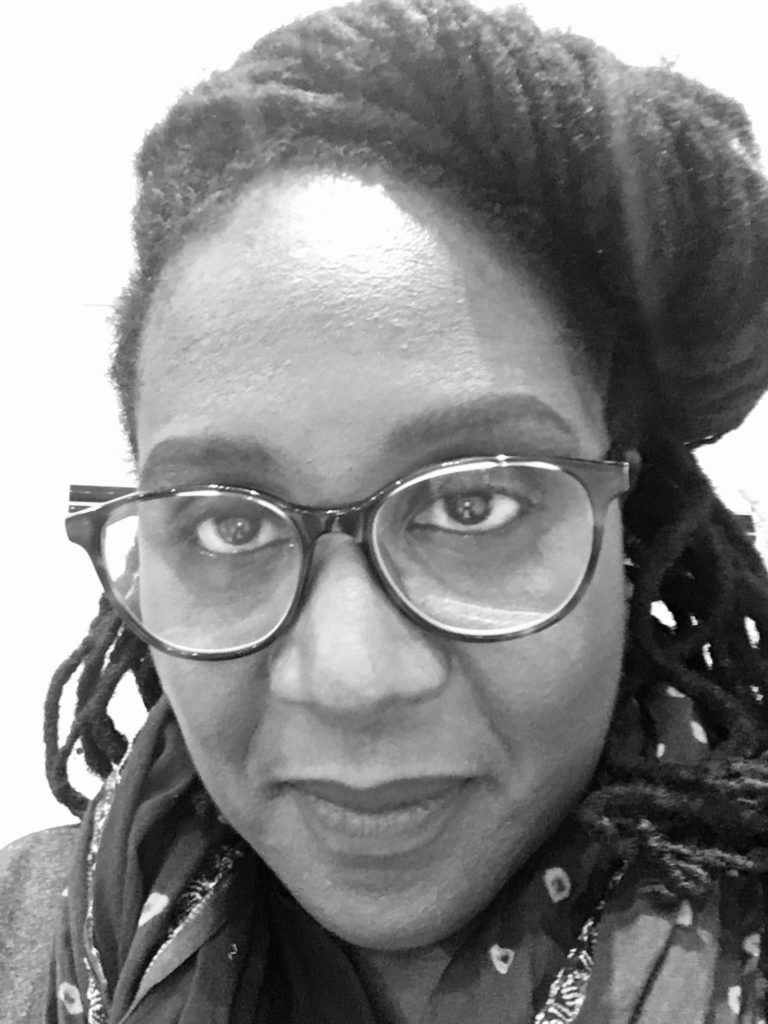‘Jay Wright is a poet in habitual movement from one place of residence to another.’
Clementine E. Burnley is a migrant mother, writer and community organiser. During a writing workshop she was introduced to the poet and playwright Jay Wright, who lived in Dundee in the 1970s as a poet-in-residence. In this piece, Burnley explores how creative people can connect across space, time and communities.
The Workshop
I so very much want to be a poet in communion with other poets. I want to attend workshops held in distant physical locations. I have a fourteen year old, and no-one to provide childcare. The internet makes it all possible. I find out about the Obsidian Foundation on the facebook page of the Scottish Black and Minority Ethnic Network. In a matter of weeks I become an Obsidian Foundation student. The Obsidian Foundation organises a brand-new, weeklong Black Poets’ Workshop, online.
I first hear about Jay Wright from Dante Micheaux, a much anthologised, prize-winning poet, and most relevant at this moment, my workshop tutor. It’s Wednesday. We are in the hump day. ‘We’ are the ten poets in Group ‘C’. I say ‘we’ a lot since moving to Scotland. Mostly I mean poets. We sit in front of our screens, blear-eyed. We are at home, alone with others, but somehow we live and breathe poetry together. We do Home school, Pandemic, and Poetry together.
I am distracted by pandemic homeschooling. But the reason I am here is the pandemic. Organisers cancelled events. Some moved events online. Rather than be upset, I savour this novelty, which means hardship for many who are not able to work from home, or who fall on the wrong side of the digital divide. I have access to a decent internet connection and to a computer. I do not have to pay the fare to London, — workshops are always in London. I don’t have to pay for expensive accommodation or grovel for childcare support.
‘Jay Wright is, unequivocally, the greatest living American poet,’ Dante Micheaux says. Wright is a poet, jazz bassist and playwright. The poem Dante has chosen is from Wright’s first collection; The Homecoming Singer. ‘Wednesday Night Prayer Meeting’ takes me back to a Protestant childhood, where I spent almost every day in church.
Back to the workshop.
Dante Micheaux is still staring into the camera. I hear something about ‘poetry as a marginal art form’, how he’s ‘vexed’ at Jay Wright’s being hyphenated, reduced to African-American poet, made into a marginal figure in American poetry.
Dante Micheaux rivets us. He reads us ‘Wednesday Night Prayer Meeting’. We read it ourselves. He asks us what we notice about it. We puzzle at the text. At first, we miss the point, and then we work it out. Christ comes, but no one in church realises the shabbily dressed unobtrusive stranger is the answer to their shouted, performed prayers. I take the scene as a kind of sacred offering, from Dante to us.
Back to the workshop. Dante Micheaux is staring into the camera. The words fall into my ear. I write down: Wright, Jay. Transfigurations. Baton Rouge: Louisiana State University Press, 2000.
‘Redemptive’, ‘difficult poet’, ‘like Walcott’, ‘refuses the saga of Europe as the centre’.
‘Pick a poet,’ Dante says, ‘read everything by that poet.’
Everything by Jay Wright is ten collections between 1971 and 2008. Lots of reading aloud, ahead.
We’re writing till late, or early depending on your point of view, if that matters in Black poetry boot camp.
For me, it is midnight til three in the morning. Late nights are not my thing. I am a lark, awake and active from about five in the morning. Early rising is a holdover from childhood. Every morning my mother, or grandmother woke us up before first light for devotions.
For this workshop, late nights have become my thing.
When the workshop is over, my ears ring with instructions from all the different tutors.
Dante Micheaux only says, ‘If you like a poet, then study what they do.’
The poetry
When I look for The Homeward Singer – it is out of print. My order gets stuck in customs. When the strong brown paper envelope arrives two months later, I blink, surprised, at the battered secondhand book. The poems in The Homeward Singer must have been in Wright’s mind in Dundee. It was published the year after he left. I look for Scotland in Jay Wright’s poetry, but I don’t find it in his words.
The Poet
Weeks after the workshop, I discover Jay and Lois Wright were based in Dundee for two years at the beginning of the ’70s. I imagine a tall, light skinned man. He’s athletic. Jay Wright played college baseball. He has a paper map of Eastern Scotland in his hand. His eyes narrow as he contemplates the Firth of Tay. I try to relate to this brilliant, learned man. Few fixed points exist on our shared landscape. The city itself, people, the university, the local culture. The internet doesn’t exist in 1970. I discover the Kingsway, a ring road completed in 1919. The Kingsway passes through Dundee on its way from Perth to Aberdeen. The photograph I see from 1962 shows only three cars on the entire stretch over green verges to the horizon. Now there are at least twelve roundabouts on the Kingsway to cope with the city’s rapid growth.
I speculate on the experience of a black poet-in-residence. While living in Dundee, Wright must be quite visible. He’s seen as not being from ‘here.’ I wonder if a visiting Fellow interacts with the ‘institutions,’ in a very different way to a Black Scot, who makes their art here and is not going anywhere else. I wonder which communities open up for the racialised artist in the 1970’s. His stay is time-limited. There might be little point in setting root.
Jay Wright is a poet in habitual movement from one place of residence to another. Dundee is a single stop in his migrancies. Born in Albuquerque, New Mexico, he moves to San Jose, California and then to Germany, eventually travelling all over Europe.
The Poetry of Movement
A blurb on the back cover of Transfigurations highlights Wright’s talent as a ‘synthesiser of cultures’. His poems move between African, European, Native American, Latin American cosmologies. Wright combines rituals, rhythms, cadences, from different continents and cultures. The same blurb mentions the ‘sense of exclusion’ in his work.
Wright, a keen observer of culture, must know that Dundee is famous for it’s jam, golden jute and jubejubes. Within a few clicks I know the British East India Company sent shipments of golden jute thread from Kolkata to the flax spinners of Dundee. Wright’s work is fully conscious of the histories of capital and his place within it.
After two years in Dundee, Jay Wright travels to Mexico where he writes ‘Boleros’. His writing in this collection is influenced by Indian faith, world religions, Asian Indian and Catholic European ideas.
In his work, Wright claims a place in the centre for his own cultural identity. He reasserts connections between African religions, ancient cultural rites and modern American life. In that way his work reinscribes those made marginal, into the centre. His poetry carries the rhythms of West Africa but also the cadences of Native American cultures. Different histories confront each other in his words.
‘Twenty-two tremblings of the Postulant’ from Improvisations Surrounding the Body:
‘You understand the danger of being strippped
of totem and amulet, the bliss of being cold
to a god’s stroke and being set, untangled
darkened in wisdom, in the direction of a self
you may never reach.
A migratory man…
We own no land,
no love, no art, no death.’
I look up transfigurations and find when something changes radically into a more beautiful shape, it has been transfigured.
Poets of Colour in Scotland now
Plenty has changed between Wright’s time and now. The Black poets who I make work with, or alongside in 2021, are post-Brexit. We are a year into the pandemic. Afro Diasporic, Caribbean, Asian and Latinx people in Britain continue to get sick and to die at higher rates than white Britons. Despite physical isolation we’re actually hyper connected to each other through online spaces. I have a theory that despite the lockdowns, many creatives of colour are more connected than would have been possible in the ‘70s. When I meet with the creatives of SBWN at a Black Writers group, they are delighted about the diversity of events online.
‘A year ago, I couldn’t have dreamed this up.’
Jade Mutyira says the SBWN network is, ‘One of the best things in my whole life.’
‘I can’t believe the stuff I’m doing, the people I have access to!’
We talk about what impact digital spaces have on whether and how we make art.
‘A year ago, I couldn’t have dreamed this up.’
I talk with Jeda Lewis about looking after children, making work at home, and living with a chronic pain condition, about access to a greater audience, expanded access to community, and to mentors. It’s been ‘Wild, making work at home, trying to earn money and making art and trying to show it to the public as well.’
‘Yeah, so that it’s not just a private activity.’
For writers like Sharon Croome and Jeda Lewis with health problems and mobility issues, being online, is ‘Transformational.’
Online art spaces allow them to maintain connections to distant networks, come together safely, plan, organise, and think of ways to support each other.
‘There are so many more opportunities.’
‘Joy, pain, inspiration. Anger,– because disabled people have been fighting for better access to arts employment, but this was possible all along.’
We talk about not going back to normal, what normal was, and what a new normal could look like. Sharon and Jeda worry about access for people who haven’t had access before. Jeda mentions Not Going Back to Normal, a collective disabled artists’ manifesto created in Scotland last year.
‘That access has to be maintained for people as the lockdown eases.’
‘We can’t go back to making things inaccessible. I hope it stays hybrid.’
Sources Quoted:
Dante Micheaux has won the Four Quartets Prize, has received fellowships from Cave Canem Foundation and The New York Times Foundation, has been shortlisted for the Benjamin Zephaniah Poetry Prize, and the Bridport Prize.
Blog Entry. A Different Center by Dante Micheaux
https://blog.bestamericanpoetry.com/the_best_american_poetry/2010/09/a-different-center-by-dante-micheaux.html
Griffith, J. (2015). Mingus in the Workshop: Leading the Improvisation From New Orleans to Pentecostal Trance. Black Music Research Journal, 35(1), 71-95. doi:10.5406/blacmusiresej.35.1.0071
Not Going Back to Normal Website www.notgoingbacktonormal.com
Wright, Jay. Transfigurations. Baton Rouge: Louisiana State University Press, 2000.

Clementine E. Burnley is a migrant mother, writer and community organiser. She loves to walk in the Scottish Highlands. Her work has been shortlisted in various short story competitions and most recently, nominated for a Pushcart Prize. At the moment she’s a Reader in Residence at Smokelong Magazine, and a contributing editor at Barren Magazine.
The Scottish BAME Writers Network (SBWN) provides advocacy, literary events and professional development opportunities for BAME writers based in or from Scotland. SBWN aims to connect Scottish BAME writers with the wider literary sector in Scotland. The network seeks to partner with literary organisations to facilitate necessary conversations around inclusive programming in an effort to address and overcome systemic barriers. SBWN prioritises BAME-led opportunities and is keen to bring focus to diverse literary voices while remaining as accessible as possible to marginalised groups.
Web links: Website | Instagram | Facebook | Twitter | Newsletter
ALSO IN THIS ISSUE

 Introducing . . . Zebib K. A.
Introducing . . . Zebib K. A.
‘I’d begun to see I could bring those stories with me into my present and my future self.’

 Danny Chung Does Not Do Maths
Danny Chung Does Not Do Maths
‘He put all of my old sketch books into the black bag. I felt like my hard work had been truly trash …












